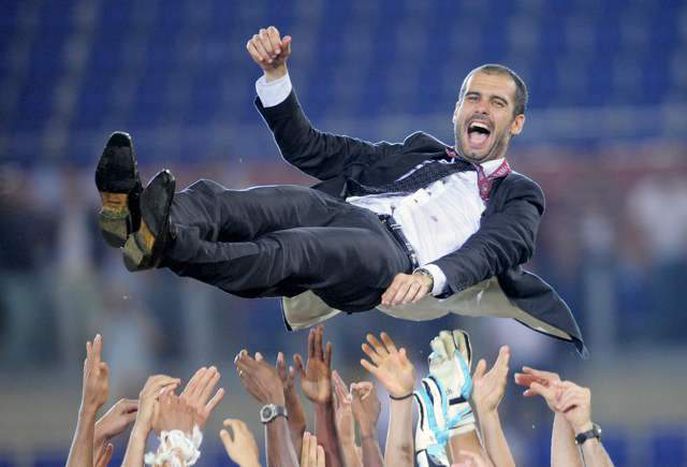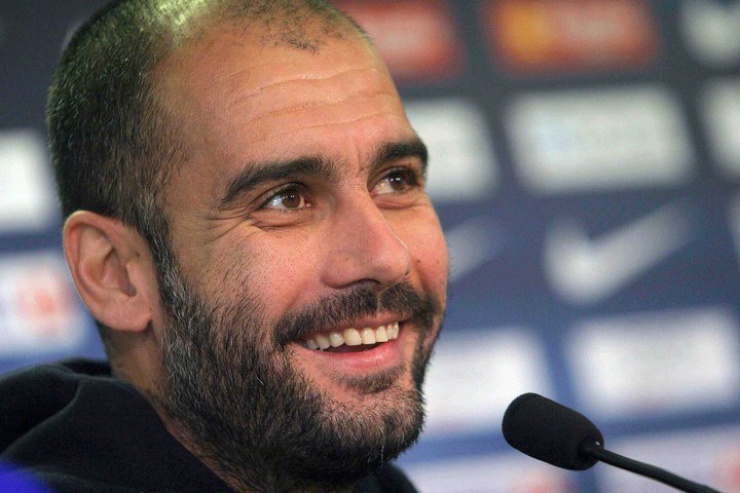
Guardiola gets German as former Barcelona manager moves to Bayern
Published on
Translation by:
Andrew BurgessWith three Spanish championships, two Spanish cups and two champions league titles, Pep has had a staggering haul in just four seasons in charge. The Catalan will take over the managerial role at Bayern Munich from the start of the 2013/ 2014 season. Surprising choice - but a wise one
After four years of almost uninterrupted success, Josep Sala Guardiola aka Pep Guardiola stepped aside as FC Barcelonamanager and passed the mantel to his assistant and fellow Catalan Tito Vilanova. Tired and exhausted by the permanent pressures of the sport, the necessity of success, the fierce rivalry with Jose Mourinho’s real Madrid and even the rumours of doping among his exceptional team, the 42-year-old needed to take a break. Mes que un club (‘more than a club’), Guardiola left behind his family and home when he left Barcelona, and is currently on a year-long sabbatical in New York.
Catalan-Dutch philosophy
The football world waited with baited breath for Manchester City and Chelsea to pounce on his signing - two rich UK clubs searching for quick and sustained success, who were not afraid to sack their managers at the slightest down turn in form. The chequebooks were out, but Guardiola instead opted for a footballing institution: Bayern Munich. The prestigious Bavarian club, the most successful in Germany, certainly made a less extravagant financial offer, but its sporting project is far more stable and certainly conforms better to Pep’s idea of football.
Read 'Football: a poor man’s sport? Not for Qatar' on cafebabel.com
For Guardiola that philosophy is key. It was his mentor Johan Cruyff, a memorable Dutch footballer in the 1970s and Barcelona manager from 1988 to 1996, that instilled it into him. Cruyff revolutionised football. His philosophy is that the ten outfield players must all attack and defend together. The forwards press to win the ball and the defenders add to the numbers when attacking. The passing of the ball is done on the ground with an increased number of quick, short and precise passes until the opposing defence is destabilised; the Spanish call it ‘toque’. Thanks to the golden generation of Lionel Messi (originally from Argentina), Xavi Hernandez and Andres Iniesta (to only name the most well-known), Guardiola reached the pinnacle of this Catalan-Dutch philosophy, that of total football.
Reconciling cultures
Yet while Bayern often do play attractive football, they do not play football like Barcelona. ‘Toque’ is not part of the German footballing culture, which instead is a mixture of speed, strength and realism. At Munich, they play direct football, passing the ball out from deep to ultra-fast wingers who then aim for target men in the penalty area. At Barcelona, long range shots are rare and each attack resembles an attacking play in handball. Guardiola deposed of the old style forwards that focused solely on finishing: the Cameroonian Samuel Eto’o, the Swede Zlatan Ibrahimovic, even Barcelona's own David Villa.

So did Bayern’s president Uli Hoeness trick Pep Guardiola into signing on? No, not at all - rather it is German football that is changing. After the stinging defeats suffered by the German national team ('Mannschaft') in the early noughties, the youth development system was revolutionised. Today it has become virtually impossible to win the title with very physical but non-technical players. Under the leadership of Matthias Sammer (a European 'golden ball' football of the year winner in 1996 and current sporting director of Bayern Munich) the German football federation has formed a fantastic generation of players who play attractive football, if not flamboyant. Since 2006 the Mannschaft have produced some magnificent performances in international competitions.
In recruiting Guardiola, Bayern believe they have found the perfect man to reconcile the traditional German style with the beautiful game, while winning matches. Like the German national team, always thereabouts but never victorious, Bayern have been the Raymond Poulidor (a French cyclist who came second eternally - ed) these past few years. They lost in the champions league finals in 2010 and 2012 (the latter played before their own crowd in Munich) and missed out on two German premiereship (bundesliga) titles to their Ruhr Valley rivals Borussia Dortmund.
Wise and ambitious choice
Therefore Pep has opted for stability – the structure and finances of the club are safe and solid (a rarity in modern-day football) – and for the sporting project. His task will be to restore confidence to a team with its own natural characteristics but one that shares the same ambition of the beautiful game as Barcelona. Ambitious, Guardiola has given himself the challenge of winning away from the home where he managed the best team in the world.
Pep has opted for stability and for the sporting project
They say to succeed, you must adapt to what you cannot change. Ultimately for Guardiola this means adapting to the players who are built for the fight and who prefer winning to the manner of winning. Victories will require the hard-workers, the waterboys such as German captain Philipp Lahm and vice-captain Bastian Schweinsteiger. Similarly, Bayern’s players will have to adapt to what they cannot change in Pep: he will always put his philosophy and his way of playing the game above the players, however talented and famous they are. In these circumstances it is unclear whether Arjen Robben (Dutch, star man of the team) as talented as he is selfish on the pitch, will have a future in Guardiola’s Bayern. Nicknamed FC Hollywood because of its cast of stars and big personalities, Bayern Munich has decided to put an end to this period of its history by opting for Pep. From now on the beautiful game and the team will be more important than the individuals.
Images: main and in-text: courtesy of © Pep Guardiola official facebook page/ videos: Guardiola quits FC Barcelona (cc) euronewsfr; Guardiola system (cc) leboakatio/ youtube
Translated from Guardiola au Bayern : l’Allemagne gagne en peps



